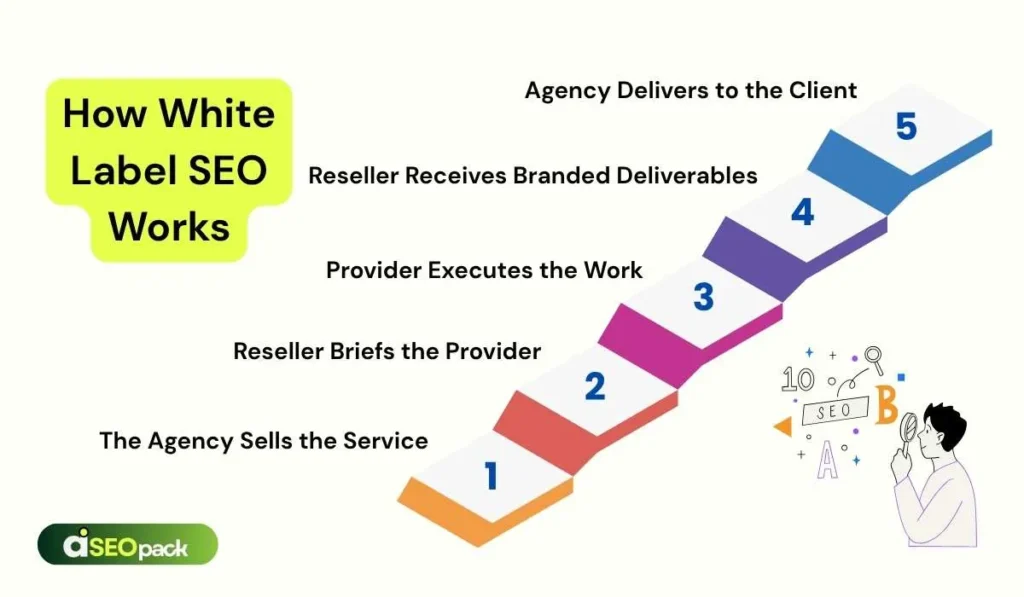Companies are always looking for effective SEO methods to increase their visibility online in the fast digital world of today. Most businesses acknowledge organic search traffic as the main source of website traffic. Imagine a situation where a successful marketing agency, which was already doing web design and PPC ads, had a huge client demand for SEO services. It can be a slow, costly, and risky process of building an in-house SEO team from scratch especially when the annual salary expenses of a small team can easily be over ₹80–90 lakhs without counting software subscriptions. Agencies thus have a white label SEO strategy as their secret weapon to quickly and efficiently scale their offerings.
By doing this, an agency can keep focusing on what they do best and the client relationship. At the same time, a skilled, reliable partner handles the complex, time-consuming SEO work silently in the background.
Moreover, almost 88% of marketers who provide SEO services now and are willing to either maintain or increase their budgets see a booming market opportunity. In this article, we will thoroughly explain what white label SEO is, how it works, and how to find the perfect partner.
What is White Label SEO?
White label SEO is a cooperative relationship between agencies in which the reseller agency (the reseller) engages an SEO-specialized company (the provider) to carry out SEO activities for the reseller’s clients under the reseller’s branding. Simply put, the provider is virtually the reseller’s in-house team.
The client receives the best SEO implementation and reporting, but it believes it is handled by its agency, which they entirely hire. Consequently, an agency can launch a completely new service or improve an existing one without the hassle of recruiting and building an internal team, and with far less investment in time and cost.
White Label SEO vs. Resellers vs. Traditional SEO
| Feature | White Label SEO | Reseller SEO | Traditional SEO |
| Definition | A third-party SEO agency performs all SEO work under your brand name while you take client credit. | You buy SEO packages from a provider and sell them to clients at a markup, usually with limited customization. | You hire and manage an in-house SEO team that handles all optimization tasks directly. |
| Branding | Fully branded under your agency’s identity, the client never knows about the provider. | Provider branding may be visible in some deliverables or reports. | 100% in-house and under your business brand. |
| Control Over Process | Moderate — you manage client relationships while the partner manages execution. | Low — limited control over processes and customization. | High — you control every stage of the SEO strategy and execution. |
| Setup Cost | Low — no hiring or tool investment needed. | Low to Medium — depends on provider pricing. | High — requires salaries, tools, and ongoing training. |
| Scalability | Very High — easy to add new clients without increasing internal workload. | Moderate — depends on the provider’s flexibility and bandwidth. | Limited — constrained by internal team capacity. |
| Expertise Level | Access to specialized SEO professionals with cross-industry experience. | Generalized expertise; quality varies by provider. | Dependent on your team’s skill level and experience. |
| Time to Start | Immediate — can start offering services right after partnership. | Quick — pre-made packages are easy to resell. | Slow — requires recruitment, onboarding, and training. |
| Best For | Digital marketing agencies want to scale fast and maintain brand identity. | Freelancers or small agencies looking for quick add-on income. | Established businesses focused on full control and long-term SEO development. |
| Cost Efficiency | High — pay only for what you need. | Moderate — package-based pricing may limit flexibility. | Low — high operational and tool expenses. |
Key Services Offered in White Label SEO
A perfect white label partner can offer numerous solutions that will cater to your client’s needs in the field of search engine optimization. Depending on the partner, these services can be tailored to meet each client’s unique needs. Key services are as follows:
On-Page SEO:
This means changing an element on the client’s site to make it more search-engine-friendly.
- Keyword Research: Discovering and analyzing the keywords for a client’s target audience.
- Content Optimization: By the use of title tags, headings, meta descriptions, and on-page copy, it is improved.
- Site Structure: By internal linking and website user experience, they work.
Off-Page SEO:
The activities that are done outside the client’s website for the promotion of their brand and to gain the trust of the user base.
- Link Building: Attentively link building to acquire or earn quality links from authoritative sites (essential for rankings).
- Local SEO: Optimizing for local searches (e.g., Management of Google Business Profile).
- Public Relations & Outreach: Getting talked about on trustworthy sites and linking or doing other stuff there.
Technical SEO and Development:
Making sure the website’s technical base conforms to standards, and it can be crawled and indexed.
- Site Audits: Locating and repairing the technical problems that cause the site not to be crawlable or have broken links.
- Page Speed Optimization: The pages are designed to load quickly, which is a significant ranking factor.
- Mobile-Friendliness: Making sure the website is well-functioning on every type of device.
Content Creation:
Create high-quality, SEO-friendly content.
- Blog posts, articles, landing page copy, and even video scripts.
- Content strategy planning.
Reporting and Strategy:
Helping hand plans and gives a data bank of facts.
- White Label Reports: Producing simple-to-understand, branded reports that show performance.
- SEO Strategy: Detailing plans and identifying tactics for SEO campaigns.
How White Label SEO Works

The white-label SEO process is typically straightforward and designed to be a seamless extension of your agency’s operations. Here is a step-by-step process on how they work:
1. The Agency Sells the Service
Your agency operates as a reseller, displaying SEO service options under your banner at a price. You interact with the client, evaluate their digital presence, and define their SEO objectives, whether it be ranking for specific keywords, enhancing local visibility, or generating organic leads.
Key stages at this point:
- Perform a preliminary SEO audit to get a clear picture of the client’s website user experience.
- Design a service bundle (e.g., on-page SEO, link building, technical optimization, content strategy).
- Make a brand-controlled, data-driven client-facing presentation of the proposal.
- The client becomes your direct line of communication once signed on, and the white label SEO partner stays in the background.
2. The Reseller Briefs the Provider
Next to closing the deal, your journey is sharing the project details with your white-label SEO colleague. It features client objectives, the target audience, liked keywords, and the campaign budget.
Moreover, the service provider can prepare a more convincing outline or strategy presentation with you to deliver measurable SEO results. Through this teamwork, you can offer your client a fully personalized, goal-driven, data-backed campaign, executed by experts in the background.
3. The Provider Executes the Work
That is the point where the wonders are unveiled. The white-label SEO partner and their team have taken over all the technical and creative tasks required to optimize the client’s site.
Routine work consists of:
- In-depth keyword research and competitor analysis.
- Technical SEO (site structure, speed, mobile-friendly).
- On-page SEO, including meta tags, internal linking, and schema markup.
- Writing quality content for blogs, landing pages, and website copy.
- Off-page SEO methods, such as link acquisition, guest posting, and citations.
- Using analytics and performance tools to track progress and ROI.
The provider is your virtual in-house SEO team, and they ensure complete confidentiality throughout the work.
4. The Reseller Receives Branded Deliverables
After wrapping up the project, the white-label SEO organization provides your agency with co-branded deliverables- reports, dashboards, content files, and performance metrics that all bear the logo, colors, and other branding elements of your agency.
Everything is brought to you as though it were produced by your in-house team, which is a big help to your agency in terms of maintaining an unbroken flow of its identity.
Deliverables are most of the time consist of:
- Reports on monthly performance and analytics.
- Updates for keyword rankings and insights for traffic.
- Drafts of the content and backlink reports.
- Next month’s recommendation for improvements.
Presenting this professional work increases your clients’ trust and authority while keeping your provider anonymous.
5. The Agency Delivers to the Client
In the end, you review the results and send the branded reports directly to your client. You communicate the progress, respond to the questions, and emphasize the measurable effect of the campaign, all under the name of your agency.
The client thus has no contact with the provider; to them, your agency is the full-service SEO expert who drives their results. This setup ensures that every successful project strengthens your brand reputation and client relationships, while your provider continues to do the heavy lifting behind the scenes.
Benefits of White Label SEO
A big part of success in running a digital marketing agency is not only doing the creative work and getting new clients, but also scaling, working efficiently, and diversifying your services. These are the main benefits that make white label SEO a revolutionary strategy:
Rapid Service Expansion
A complete SEO service line is readily available to agencies through a white-label partnership without the need to spend months hiring, training, or onboarding new staff. Your agency can thus start selling SEO services immediately and meet clients’ demands without delay.
Cost-Effectiveness
Establishing an in-house SEO team can be expensive, as one has to consider salaries, tools, and training. A white label provider takes care of it all and charges you a predictable monthly or project fee for the service. You can use the best tools and tap top expertise without having to shoulder the full overhead for an extended period of time.
Focus on Core Business
By outsourcing SEO, the team inside the company will be free to focus on the things that they are really good at, i.e., bringing in more sales, deepening the relationships with the clients, and coming up with new marketing ideas. In this way, you can simplify business operations and achieve even better results with your other services.
Scalability
By using white-label SEO, you can continue to expand your business without worrying about limitations. No matter if you have just 5 or 50 SEO clients to introduce, a dependable partner can scale their delivery right away, without the need for recruiting or the pressure of operations, just a smooth extension to meet client demand.
Access to Experts
The best white-label partner provides you with the support of a team of well-versed SEO professionals proficient in various industries and different niches. Such a high standard of expertise would be the main factor in achieving consistent, high-quality outcomes, which, in turn, attract more clients and thus increase customer satisfaction.
Pricing and Cost Considerations
In order to control the budget and the business model in a proper way, it is necessary to have a clear understanding of different pricing models while evaluating a white-label SEO partnership. The cost can vary greatly depending on where the provider is, how much work there is, and what the skill level is. Below is a general overview:
| Pricing Model | Description | Best For |
| Monthly Packages / Retainer | A fixed monthly fee for a set amount of work or specific services over a contract term (e.g., 6 or 12 months). | Ongoing, consistent SEO solutions and predictable budgeting for the client. |
| Hourly Rate | Paying an agreed-upon hourly rate for work performed. The average hourly rate is around ₹8,000–₹11,000. | Small, ad hoc tasks, consulting, or short-term projects where the total time is hard to estimate. |
| Project-Based Pricing | A single, set price for a defined, one-off project (e.g., a technical SEO audit or a batch of 10 articles). | Non-recurring, specific projects like website migrations or content backlogs. |
| Custom Pricing | A quote built specifically around your unique needs and a large client’s complex requirements. | Large agencies or clients with highly specialized and complex needs that don’t fit standard packages. |
Furthermore, it is always good to see precisely what is included in the price when selecting a provider. Some providers may charge extra for advanced reporting tools, additional revisions, or premium link placements. Also, ensure the pricing structure allows you to apply a fair markup so that SEO white-labeling can be a profitable activity for your agency.
Choosing a White Label SEO Partner
It is vitally important to choose the right partner for your white-label venture to succeed. Look for these key qualities:
- Proven Track Record: The SEO white-label partner must be able to provide evidence of their past success through a demonstrable history of increasing organic traffic for their clients. You should check for detailed results and case studies presented in precise, concise figures.
- Transparent and Ethical Work Processes: The partner should also comply with Google’s ethical guidelines without any doubt (no black-hat activities such as link buying, keyword stuffing, or cloaking). Inquire about their exact procedure and the SEO tools they employ.
- Excellent Customer Service: How good the partner’s customer service is will determine how easily you can reach the partner. The faster their support team responds, the more efficiently you can deal with your customer. Check whether there are multiple ways to contact, such as phone, email, and chat, and whether support is available worldwide or only in certain regions.
- Strong Online Presence: As advertising is one of their primary services, their website should be well optimized and rank on the first page of search results. They should be the ones setting the example, thus proving their statements. In addition, look for positive, impartial feedback on independent platforms like G2, Capterra, or Trustpilot.
Checklist of questions to ask your potential partners:
- What steps do you take to improve the ranking of a website?
- Are you in a position to handle the volume of our clients and expand with us?
- Do I get to give full credit to my agency for the work, and are you willing to be a brand representative?
- If permitted by NDAs, can you provide samples of your work and reporting?
- What are your billing cycles and terms? How transparent is your pricing model?
Risks and Challenges
While a powerful tool, partnering with white label SEO does come with some challenges you must manage. These include:
- Reduced Direct Control: You hand over the execution of a core service. If the provider uses unethical tactics or delivers sub-par work, it’s your agency’s reputation that suffers.
- Communication Gaps: The pressure of working with a team far away or with a company in a different time zone can affect your mood through the disappointment of delays and misunderstandings that are waiting to hit your project timelines.
- Dependency: As a result of being excessively dependent on one provider, you will become the one who is in danger when such a partnership is terminated unexpectedly. Moreover, gaining knowledge about their method will allow you to inform your clients about it.
- Quality Assurance: The final work is your obligation. A procedure must be in place to check the quality of different outputs before client delivery.
- Brand Alignment Issues: A white-label partner may not fully understand or adhere to your agency’s brand voice, culture, or customer relations approach, so you will need to work harder to maintain a consistent brand.
Conclusion
The response to the question “What is white label SEO?” is obvious: It’s a strategic, versatile, and cost-saving collaboration through which agencies can immediately deliver professional-level SEO services under their own brand. The model offers an incredible opportunity to increase income, broaden the service portfolio, and focus on client relationship management for marketing, web design, or consulting companies, all at once, while meeting clients’ demand for quality, results-oriented SEO. Your agency’s growth will be both profitable and sustainable if you choose a transparent, ethical, and experienced partner.
FAQs
1. What makes white label SEO different from a freelancer?
A white-label SEO provider is typically a full agency or a large platform with a complete team, established procedures, and resources for quality control and reporting. On the other hand, a freelancer is a single individual who usually focuses on one area, offering less scalability and less comprehensive services than a full white-label partnership.
2. Is white label SEO a business that can last long?
Definitely! It immediately creates a client-demand solution for agencies without the various overheads, making it a scalable profit center. This model’s ability to quickly adapt to market changes makes it suitable for long-term expansion.
3. Is it necessary to have SEO knowledge to resell it?
Yes, you need to understand SEO basics to sell it and handle client expectations effectively. Nonetheless, your white label partner is the one handling the complicated, day-to-day operations, so there is no need for you to be a technical expert to a deep level.
4. Is my white-label partner going to have direct communication with my clients?
Usually, they do not. The provider works behind the scenes in the foundational model of white-label SEO. Still, some sophisticated partnerships might give the provider a role in meetings or pitches as a “specialist team member” from your agency, so it’s always under your guidance and branding.
5. How fast can a white label SEO campaign deliver results?
SEO is a resource that pays off later. While some quick wins may come from technical fixes or local rankings, major results (such as significant keyword ranking improvements and increased organic traffic) usually require a 3 to 6-month time frame.



